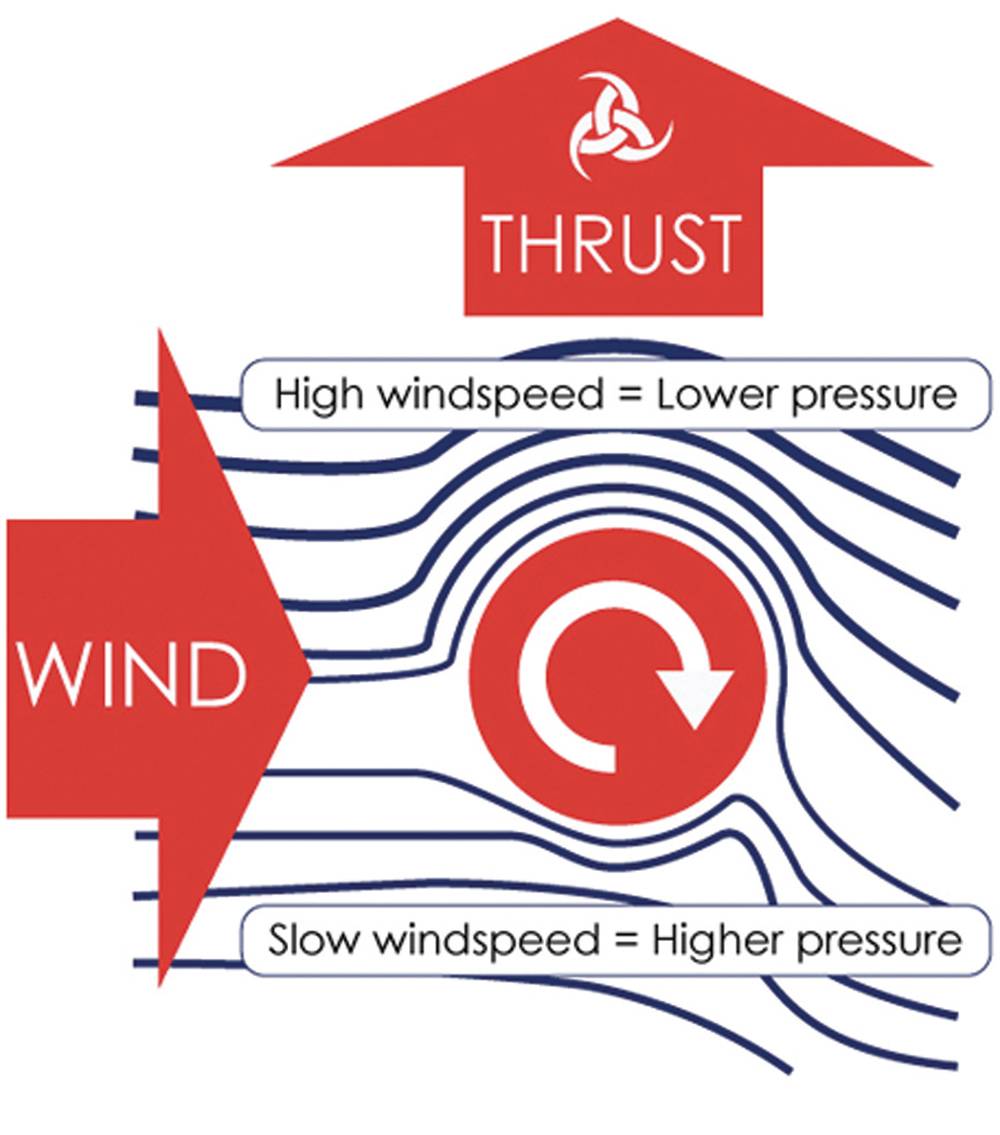
RoLo cargo ship made its first voyage in August 2010
Credit: Nick's Cruise Corner/Blogger/Google
International shipping is responsible for a significant portion of atmospheric pollution.1
From time-to-time, sail has been trialled to reduce emissions. The spinning sail was invented by the German engineer Anton Flettner & demonstrated in 1925.

How a spinning sail can produce thrust
Credit: MarineLink
Now a number of shipping companies are trialling rotating sails.
The Guardian – “‘Spinning sail’ rebooted to cut fuel & make ocean tankers greener”
https://www.theguardian.com/environment/2017/mar/14/spinning-sail-reboot-cut-fuel-make-ocean-tankers-greener
New Atlas – “Century-old rotorsail design gets modern makeover”
https://newatlas.com/norsepower-rotor-sail-shipping/48435/
__________
1 Wikipedia: “Environmental impact of shipping”, https://en.wikipedia.org/wiki/Environmental_impact_of_shipping
“Of total global air emissions, shipping accounts for 18 to 30 percent of the nitrogen oxide & 9 percent of the sulphur oxides.”
“3.5 to 4 percent of all climate change emissions are caused by shipping, primarily carbon dioxide.”
/ spinning sail cut fuel consumption make ocean tankers greener Maersk tanker Norsepower rotor sails technology first invented German engineer Anton Flettner trialled Atlantic crossing 1926 spinning sail can produce thrust direction of thrust can be reversed by reversing the direction of rotation international shipping substantial portion of atmospheric pollution sail trialled reduce emissions rotating sails spinning sail produce thrust direction of thrust reversed reversing direction of rotation MarineLink Flettner Rotor test 1925 ECO FLETTNER spinning sail cut fuel make ocean tankers greener rotorsail design environmental impact of shipping total global air emissions shipping accounts for 18 to 30 percent nitrogen oxide 9 percent of the sulphur oxides climate change emissions caused by shipping carbon dioxide CO2 climate change global warming ocean-going tanker fitted with a type of spinning sail invented almost a century ago more environmentally friendly tankers worldwide unusual sails rotating columns fixed deck of the ship interaction with the wind provides forward thrust trial is backed by Maersk one of the world’s biggest shipping companies Shell’s shipping arm international shipping highly polluting bunker fuel industry coming under increasing pressure play its part in tackling climate change reducing emissions technologies explored cut pollution include kites batteries biofuels spinning or rotor sail invented German engineer Anton Flettner put it into practice on two ships crossed the Atlantic in 1926 propels the ship when wind passes spinning rotor sail air flow accelerates on one side decelerates opposite side creating thrust force perpendicular to the wind direction rotor sails installed 240 metre-long Maersk tanker modern lightweight versions produced Finnish company Norsepower 30 metres tall 5 metres in diameter largest rotor sails ever deployed first to be used on a tanker favourable wind conditions rotor sail produce 3MW of power 50kW of electricity needed to turn it Norsepower’s CEO Tuomas Riski wind direction reverses rotation of the sail reversed overall fuel savings 7-10% expected equivalent 1,000 tonnes of fuel a year deployed rotor sails on roll-on/roll-off ferry saving of 6% technology improvements environmental regulations rotor sail compete with diesel power wind renewable energy available at large scale in the ocean new sails fitted during the first half of 2018 analysed at sea until the end of 2019 few fuel-saving technologies offer double-digit percentage improvements Andrew Scott UK’s Energy Technologies Institute industry-government partnership helping fund the trial shipping moves much of the world’s goods significant source of air pollution carbon emissions deal agreed by the UN’s International Maritime Organisation 2016 cut sulphur emissions from 2020 heavily criticised postponing any action on greenhouse gases IMO International Monetary Organisation acting Kyoto Protocol IMO’s latest greenhouse gas emissions reduction plan envisages collect data no commitment to act NGO Transport & Environment shipping companies exploring cleaner energy systems cruise liner firm Hurtigruten ordering pair hybrid powered ships battery system power them waste heat ship’s diesel engines produce electricity German company SkySails large kites provide wind power modern shipping Enercon fitted four rotor sails transport ship 2010 Norsepower’s rotor sails will be larger /